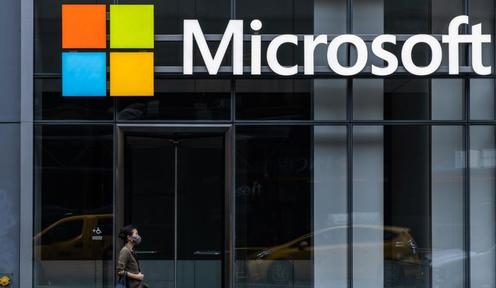
Microsoft has spent decades building goodwill with Beijing, and that could help its bid to buy TikTok’s operations in the United States and a few other countries. That is unless deteriorating US-China relations get in the way.
Microsoft (MSFT) has emerged as the leading candidate to save TikTok from President Donald Trump’s threat to ban the app unless it finds an American buyer. The app is owned by Beijing-based ByteDance. A deal would give Microsoft ownership and operation of TikTok services in the United States, Canada, Australia and New Zealand.
Unlike other big US tech companies, Microsoft has some major clout in China, and its products have a significant presence there.
It has been in China since 1992 and employs 6,000 people in the country. Microsoft software is used by the Chinese government and companies, LinkedIn is a popular social media platform for Chinese professionals, and Bing is the only foreign search engine with any amount of market share in the country. The Washington State-based company also boasts an A-list alumni network in China, thanks to the hugely influential Microsoft Research Lab Asia, or MSRA.
Microsoft’s clout
The Beijing-based lab — a world-class computer science research hub — is widely viewed as a boot camp for China’s technology sector. Many founders and senior executives at companies such as Alibaba (BABA), smartphone maker Xiaomi, and e-commerce upstart Pinduoduo (PDD) got their start at Microsoft and were trained at MSRA. Even Zhang Yiming, the founder and CEO of ByteDance, briefly worked at Microsoft before reportedly leaving out of boredom.
Microsoft “is really well respected” in China’s tech community, according to Edith Yeung, who spent years investing in Chinese companies with venture capital firm 500 Startups. She is a partner with Race Capital, investing mostly in US firms.
That respect is especially true when it comes to artificial intelligence, Yeung said. One of the best-known AI experts in the world, former head of Google China Kai-Fu Lee, helped establish MSRA.
ByteDance has a slew of addictive apps that all rely on AI algorithms. The apps learn from users’ behaviour, and continuously feed them content that they want to see.
Many in China’s tech industry believe Microsoft is “the best choice,” to buy TikTok because at least Microsoft has “the AI chops to understand what ByteDance is doing,” said Yeung.
A forced sale of TikTok to Microsoft would be “a win-win-win, in a pretty horrible situation,” said Tony Verb, co-founder of GreaterBay Ventures & Advisors, which works with Chinese entrepreneurs.
It will likely be a victory for Trump, it’s good for Microsoft to get a fast-growing product like TikTok, and for ByteDance, “it’s the less horrible outcome,” according to Verb.
Microsoft and ByteDance did not respond to requests for comment for this story.
Challenges in China
Like other multinationals, Microsoft has had its fair share of challenges in China.
Rampant piracy prevents the company from making significant inroads in the market. Microsoft president Brad Smith said in January that even though Microsoft software is widely used in China, the country accounts for less than 2% of the company’s global revenue.
Last year, Microsoft’s search engine Bing was briefly blocked in China. It wasn’t clear what sparked the suspension, but it came as tensions between the United States and China were spilling over into the tech sector, with Washington stepping up its campaign against Chinese tech firm Huawei.
Microsoft is also facing scrutiny from China’s State Agency for Market Regulation, which is investigating whether it has violated the country’s anti-monopoly laws. The probe is focused on Windows and Office software.
And at a time of escalating tensions between Washington and Beijing, Microsoft’s business in China could prove to be a liability, as the world’s two largest economies shun cooperation and inch closer to a technological decoupling.
Some Trump administration officials are suspicious that Microsoft is too cosy with Beijing.
Microsoft-owned products such as Bing and Skype have enabled Chinese surveillance and censorship, White House trade adviser Peter Navarro said in an interview on CNN on Monday.
Bing is able to operate its Chinese site, cn.bing.com because it censors its search results. During a panel at the World Economic Forum in Davos, Switzerland, last year, Smith said Microsoft has “days when there are either difficult negotiations or even disagreements” with Chinese authorities.
“There’s some fishy stuff going on there,” Navarro said. If people use Skype in China, the Chinese Communist Party “is listening in,” he added.
“The question is, is Microsoft going to be compromised?” Navarro said. He also questioned whether Microsoft should be forced to “divest its Chinese holdings” if it buys TikTok.
China could still claim ‘a pretty good win’
Meanwhile, Trump has touted the forced sale of TikTok as a win and said that the US Treasury should get a cut of the deal if it goes through. Industry experts say the TikTok deal could cost Microsoft between $40 billion and $50 billion.
Trump’s comments sparked an outcry in China. State-run newspaper China Daily likened the sale of TikTok to a “smash and grab” raid orchestrated by the US government.
But the sale of TikTok should also be viewed as a huge win for China’s tech industry and the innovation coming out of Beijing, according to Rich Robinson, a professor at Peking University and founding partner of Whip Wham, an investment practice focused on China and Asian markets.
“Last time I checked, $50 billion is a pretty good win,” Robinson said.
ByteDance was able to get hundreds of millions of users around the world hooked on TikTok, the app brought in tens of billions of dollars in revenue last year and it was the first Chinese social media platform to a breakthrough in international markets, he points out.
“That’s all winning,” said Robinson. “Too bad it got politicized.”











